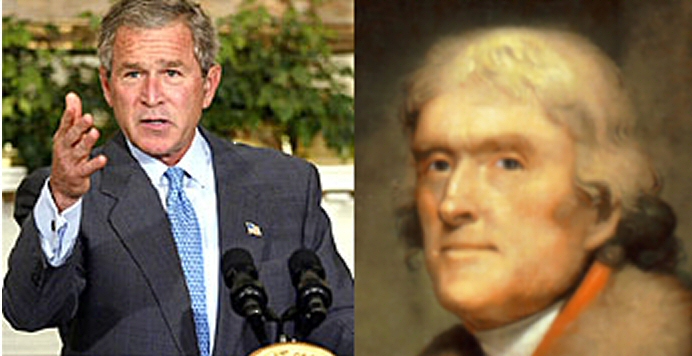
On Friday, Americans will mark the 232nd anniversary of a statement that ranks as one of the grandest, most sublime declarations in American history, one that encapsulated the finest of American ideals and one that made the United States a source of hope to the world.

Today, in contrast, we mark the fifth anniversary of a statement that ranks as one of the most outrageous, most shameful declarations in American history, one which encapsulated how far an American president could depart from the finest American ideals, and one that made the United States a source of fear to the world.
On July 4, 1776, Thomas Jefferson proclaimed, in the Declaration of Independence: "We hold these truths to be self-evident, that all men are created equal, that they are endowed by their Creator with certain unalienable rights, that among these are life, liberty and the pursuit of happiness."
On July 2, 2003, George W. Bush procalimed, in what might be termed his Declaration of Indecency: "Bring 'em on!"
Here, in context, is what President Bush said five years ago today:
"There are some who feel like that, uh, if they attack us, that we may decide to leave prematurely. They don't understand what they're talkin' about if that's the case. . . Let me finish. Um, there are some who feel like, that, you know, the conditions are such that they can attack us there. My answer is bring 'em on! We got the force necessary to deal with the security situation."
Mr. Bush was, the New York Times said at the time, coming "close to taunting Iraqis who were attacking American-led forces in Iraq." Some former military leaders said the president's statement might goad Iraqis and lead to the deaths of American troops.
The only mistakes in those contemporary assessments were the qualifiers. Mr. Bush did not "come close to taunting" the Iraqis. He was taunting them. His statement was not one that might goad Iraqis and lead to Americans being killed. It was certain to do so.
Regrets? He's had precious few -- but then again, too few to mention.
Asked in 2006 to say which missteps and mistakes of his own he most regrets, Bush responded:
"Uh, saying 'bring it on,'--that kinda tough talk, you know, that sent the wrong signal to people. I learned some lessons about, uh, expressing myself maybe in a more sophisticated manner," this utterly unsophisticated man said. "Uh, 'wanted dead or alive,' that kind of talk. It, uh, I think in certain, uh, parts of the world it was misinterpreted and so I learned from that."
In fact, Bush's words weren't misinterpreted in parts of the world. He was taken to mean exactly what he said, which was what he meant: We're the tough guys. Just try to mess with us, and we'll blow your f***in' heads off! Bush was inviting people to try to kill American troops. Few things a commander-in-chief could say would be as reprehensible as this comment.
Mr. Bush fancies himself a Christian. Can anyone seriously imagine a swaggering Jesus, dressed as a cowboy, saying something like this? Go ahead, I dare you! Just try to kill our people! (Actually, I suppose some can. Tens of millions, after all, have read the "Left Behind" books that depict an imagined greater gory of Christ.
George W. Bush is, as I detail in my new book, Grand Theft Jesus, the Jesus-Thief-in-Chief.
A few weeks ago, the president told The Times (U.K.) that "his gun-slinging rhetoric made the world believe that he was a 'guy really anxious for war' in Iraq' and that his rhetoric 'indicated to people that I was, you know, not a man of peace.'"
Here, once again, the current president's misuse of language is telling. The problem is precisely that Mr. Bush was not "anxious" about a war in Iraq, as any sensible person should have been. He was eager for war in Iraq, as no sensible person would have been.
For a commander-in-chief to invite potential enemies to attack his troops is an absolute disgrace. Nor was the comment an isolated slip of the tongue. It reflected the cocky, swaggering, rough-tough cowboy image of someone who likes to playact at being a "real man."
The words were not those of a brave man; they were those of an adolescent who taunts someone and expects others to do his fighting for him: My brother can beat up your brother!
Like his brothers-in-urging-arms, Dick Cheney and most of the neocon architects of the Iraq war, during the Vietnam War, for which they were also cheerleaders, Bush was careful to avoid being within thousands of miles of where the enemy would "bring it on."
George W. Bush was a member of the coalition of the unwilling when it came to going into war himself, but the leader of the coalition of those willing to send other people into a needless war. Then he said to any possible enemies, come on and try to kill those other people -- those other Americans -- that he had sent into that needless war.
The anniversary of a day of shame in our nation's history precedes the anniversary of our nation's day of birth.
On the Fourth of July this year, let us repudiate the idea of America that George W. Bush enunciated in 2003 and revive the idea of America that Thomas Jefferson enunciated in 1776.
More important, let us do the same on the Fourth of November this year.
Historian Robert S. McElvaine is Elizabeth Chisholm Professor of Arts & Letters at Millsaps College. His latest book is Grand Theft Jesus: The Hijacking of Religion in America ![]() .
.
